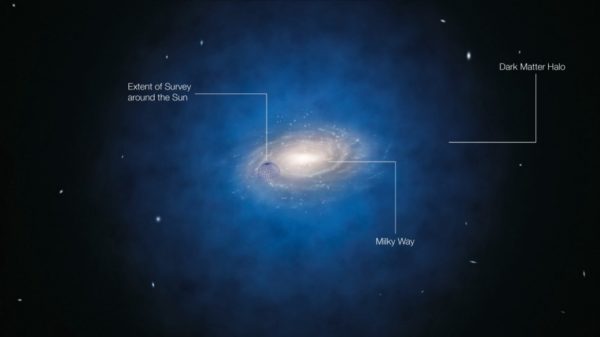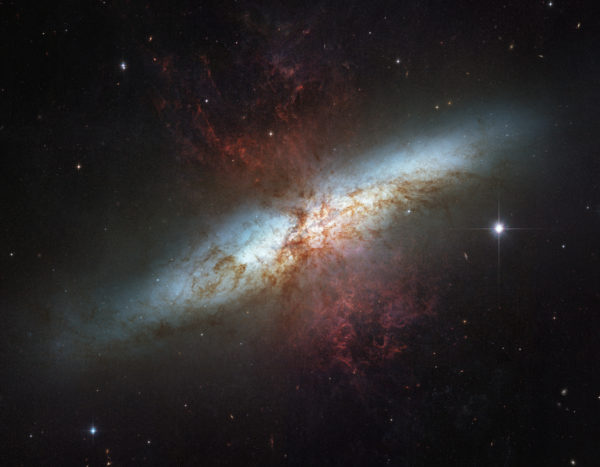“The privilege of a lifetime is being who you are.” –Joseph Campbell
Making up some 85% of the mass in our Universe, dark matter is necessary to explain the motions of individual galaxies, the grouping and clustering of assemblies of galaxies, the large-scale structure of the Universe and more. But on a much closer-to-home level, dark matter may be absolutely essential to the origin of life, too!
 Image credit: ESO/L. Calçada, of the illustration of the dark matter halo surrounding the luminous disk of our galaxy.
Image credit: ESO/L. Calçada, of the illustration of the dark matter halo surrounding the luminous disk of our galaxy.
Without dark matter, supernova explosions and starburst events would still create copious amounts of heavy elements, driven outwards by winds and the force of the explosions. But it’s the extra gravity of the dark matter that prevents most of this material from escaping, and allows it to take part in the formation of future generations of stars, to participate in rocky planet formation, and to deliver the ingredients necessary for life.
 The Cigar Galaxy, M82, and its supergalactic winds that would drive all this matter out of the galaxy itself, were it not for dark matter. Image credit: NASA, ESA, The Hubble Heritage Team, (STScI / AURA); Acknowledgement: M. Mountain (STScI), P. Puxley (NSF), J. Gallagher (U. Wisconsin).
The Cigar Galaxy, M82, and its supergalactic winds that would drive all this matter out of the galaxy itself, were it not for dark matter. Image credit: NASA, ESA, The Hubble Heritage Team, (STScI / AURA); Acknowledgement: M. Mountain (STScI), P. Puxley (NSF), J. Gallagher (U. Wisconsin).
Go get the whole, detailed story today, and find out why life needs dark matter to exist after all!
- Log in to post comments

Apparently, there’s not much if any difference between “dense” and “sparse and diffuse”.
For Ethan writes
“But on smaller scales, [dark matter is] too sparse and diffuse to impact the motion of the Solar System, the matter here on Earth, or the origin and evolution of humans in any
meaningful way.”
Yet, in an article, which mentions Ethan’s work, titled “Dark Matter is Denser in the Solar System”, we read
“Dark matter isn’t just far off in the Milky Way or somewhere on the other side of the Universe, though: it’s right here at home in our Solar System. In a recent paper submitted to Physical Review D, *Ethan Siegel* and Xiaoying Xu of the University of Arizona analyzed the distribution of dark matter in our Solar System, and found that the mass of dark matter is 300 times more than that of the galactic halo average, and the density is 16,000 times higher than that of the background dark matter.”
http://www.universetoday.com/15266/dark-matter-is-denser-in-the-solar-s…
From the eight-year-old (poorly edited) pop-sci item that S.N. inexplicably dredged up:
"Over the history of the Solar System, Xu and Siegel calculate that 1.07 X 10^20 kg of dark matter have been captured, or about 0.0018% the mass of the Earth."
It's almost as though he didn't understand it.
I am not an astrophysicist but I do fail to see how modern astronomy and associated theory can distinguish between a few hundred thousand primordial 30 sol mass black holes and dark matter in the vicinity of the Milky Way. One would require only small adjustments to the perceived physics in the hundred thousand first years after the big bang and the other would require extensive modifications to the theories underlying modern physics. Which is more probable?
Have you checked out this entry?
Yet, we see plenty of planets, including the so called suoer-earths around stars with lower metallicity than the earth. Do we know how much metallicity we need for earthlike planets, and how much is usually too much?
What would happen with more ordinary matter and less dark matter?
"What would happen with more ordinary matter and less dark matter?"
Good question Ted.
Ethan?
Re 7: We would have smaller galaxies.
As merely one point of difference.
Though this doesn't mean no galaxies. Open questions are open to being answered to whatever length the one answering wishes. If you wished a different extent, you should have been more specific.